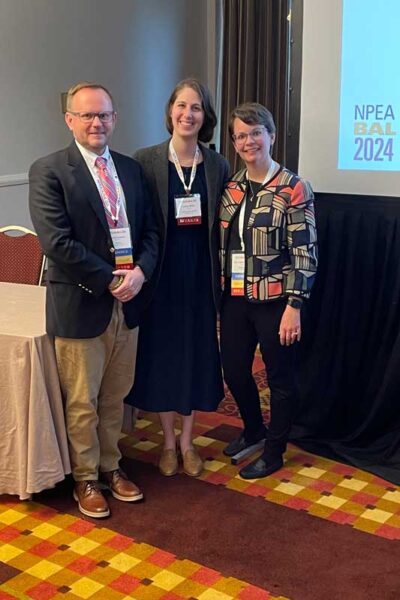By Rachel Williams, NACAC Communications
Arlington, VA (April 29, 2024) – To make college admission more equitable, institutions should look more deeply into a student’s body of work from secondary school to assess their performance and college readiness.
 That was the key message from the Integration of Performance Assessments in College Admissions panel at the National Partnership for Educational Access (NPEA) conference in Baltimore, Maryland on April 17. David Hawkins, chief education and policy officer at NACAC, joined Larkin Willis, research and policy associate at Learning Policy Institute, and Blaire Moody Rideout, director of admissions at Michigan Ross School of Business, on the panel.
That was the key message from the Integration of Performance Assessments in College Admissions panel at the National Partnership for Educational Access (NPEA) conference in Baltimore, Maryland on April 17. David Hawkins, chief education and policy officer at NACAC, joined Larkin Willis, research and policy associate at Learning Policy Institute, and Blaire Moody Rideout, director of admissions at Michigan Ross School of Business, on the panel.
A great deal of inequity results from the access advantaged students have to college preparatory coursework, test preparation activities, essay assistance, and the ability to have multiple standardized test sittings, according to Toward a More Equitable Future for Postsecondary Access, a joint NACAC-NASFAA report.
To help combat those inequities, things like character and portfolios of student work should be considered in the admission process.
At Michigan Ross, for example, the school in 2017 began putting less emphasis on testing, rigor of curriculum, and letters of recommendation, and more emphasis on student reflections and artifacts that demonstrate their learning in action. Since adopting this approach, they’ve received reflections from students about the business implications of a current event or issue in their community, and an image of scout badges a student earned after teaching younger scouts about STEM and coding skills.
These supplementary application items help demonstrate a student’s mastery of content, illuminate their interests and passions, expand upon their high school experience, and demonstrate their communication and collaboration skills.
Today, Michigan Ross is reporting enrollment increases for women, students with racially minoritized identities, students from families with limited incomes, and first-generation college students.
“We know that traditional admission practices were not built with equity in mind,” said Hawkins. “That’s why it’s important that today, we raise awareness, advocate, and work for their redesign so that students have greater access to a higher education.”
NACAC has worked with Learning Policy Institute since 2016 on its Reimagining College Access initiative, which will become a prominent part of a new NACAC center that’s in development.
For more about the center and its progress, visit NACAC’s Newsroom.